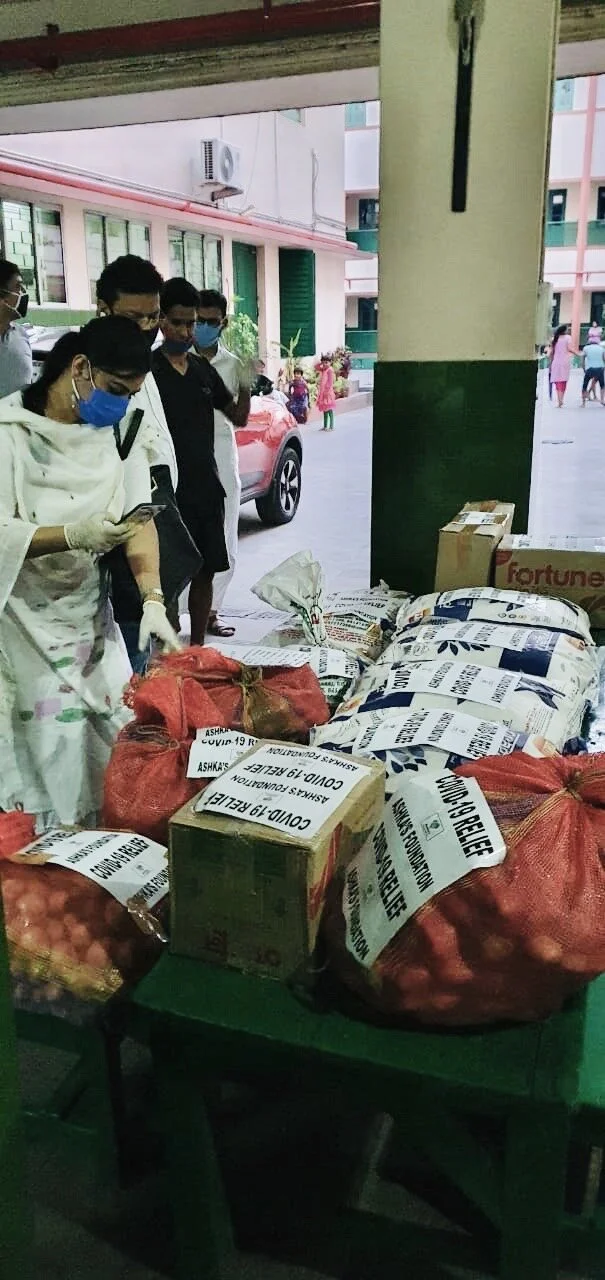When Calamity Turned to Compassion, by Ghazala Yasmin, Kolkata
Born and raised in Patna, Bihar, and currently residing in Kolkata, West Bengal, Ghazala is a media educator, filmmaker, TV commentator, gender activist, poet, and feminist.
“I am definitely the unluckiest one!” Arhan grumbled weepily as he rushed to embrace me.
“Stop!” I shrieked, dropping a pile of grocery bags made soggy from my sweaty body.
The paper bags succumbed to the weight of things, and onions and potatoes, apples and melons, bread and buns, oats and noodles were strewn all around the drawing room floor. My eyes rounded in horror as sticky, yellow liquid oozed out from another leaky bag. The eggs were history.
Arhan froze as I shouted, “I need to disinfect myself first, don’t you see?”
I peeled off the gloves clinging to my hands like a second skin. The muggy and stale face mask needed to wait until I had thoroughly cleaned my hands. You never know, there might be that monster of a COVID-19 bug hiding somewhere in the crevices and folds of the rubber.
As I rushed to the washroom to clean and change, Arhan continued his sad sob story about the indefinite postponement of his board exams. I shuddered at the thought of the two tragedies on hand: my son’s unfortunate predicament over his career, and the mess on the floor.
Just living in the lockdown was perhaps the most difficult existential crisis. I grimaced, collected the scattered food items on a tray, and took them to the kitchen sink for a thorough wash. Oh wait, the buns turned to mushy dough as water seeped from the edges of the packaging seal. I cursed myself under my breath, and my horrified son turned around to stare. Never had he imagined that I, a champion of great etiquette and refined language, could make such sordid sounds. I cursed myself again, this time within my muzzled mind.
The house helps were a thing of history. The housework piled up, with cooking full meals, cleaning and sprucing, the stinky plates, moldy shelves, and dusty furniture. There was too much pressure to reorganize my university classes online. I felt like a zombie, grumpy and cringy, unkept and shabby most of the time.
I corrected my son as I collected myself out of this needless reverie.
“You know, I am the unluckiest one in this pandemic, and you can’t even imagine…”
The buzzing phone stopped me in my painful rant. It was my house help, Saira. I felt ecstatic hearing her shrill nasal tone, and then I paused. Her voice trembled as she gathered herself to speak, and there was a staccato buzz. Mobile network and connectivity issues are acute in the Lal Maidan bustee (a slum cluster in North Kolkata), where she stays. Then there’s the drinking water crisis, electricity problem, and mosquitoes by the plenty. Saira strained herself to speak again as the electronic buzz of the phone receded.
“Didi, I have bad news to share,” she said.
“Is your food supply over?” I guessed. “Should I transfer some more cash into your account?”
Food crises were a glaring reality in the wake of the complete lockdown. Most daily wage earners, rickshaw pullers, and immigrant laborers were in a dismal state.
“Didi …” Saira found her voice again. “It’s my granny. She died. Not of COVID-19, she starved to death in this lockdown.”
Irony, thy name is pandemic. And I had thought that I, with my surplus of food, safety, and resources, was the unluckiest one. I said a little prayer and made a firm resolve. No one in Kolkata would go hungry in this time.
The next day, our plans were chalked out, a shout out went up on Facebook, and help from friends near and far started pouring in, so that we could reach out to our fellows in the City of Joy.
_________________________
(This story was prepared for an “Imagine Another World” online storytelling workshop held October 14, 2020.)
Protect yourself and others from COVID-19: wear a face covering over your nose and mouth, practice physical distancing from other people, and avoid settings that are crowded, indoors, or involve close contact. More information about how to stay healthy.

